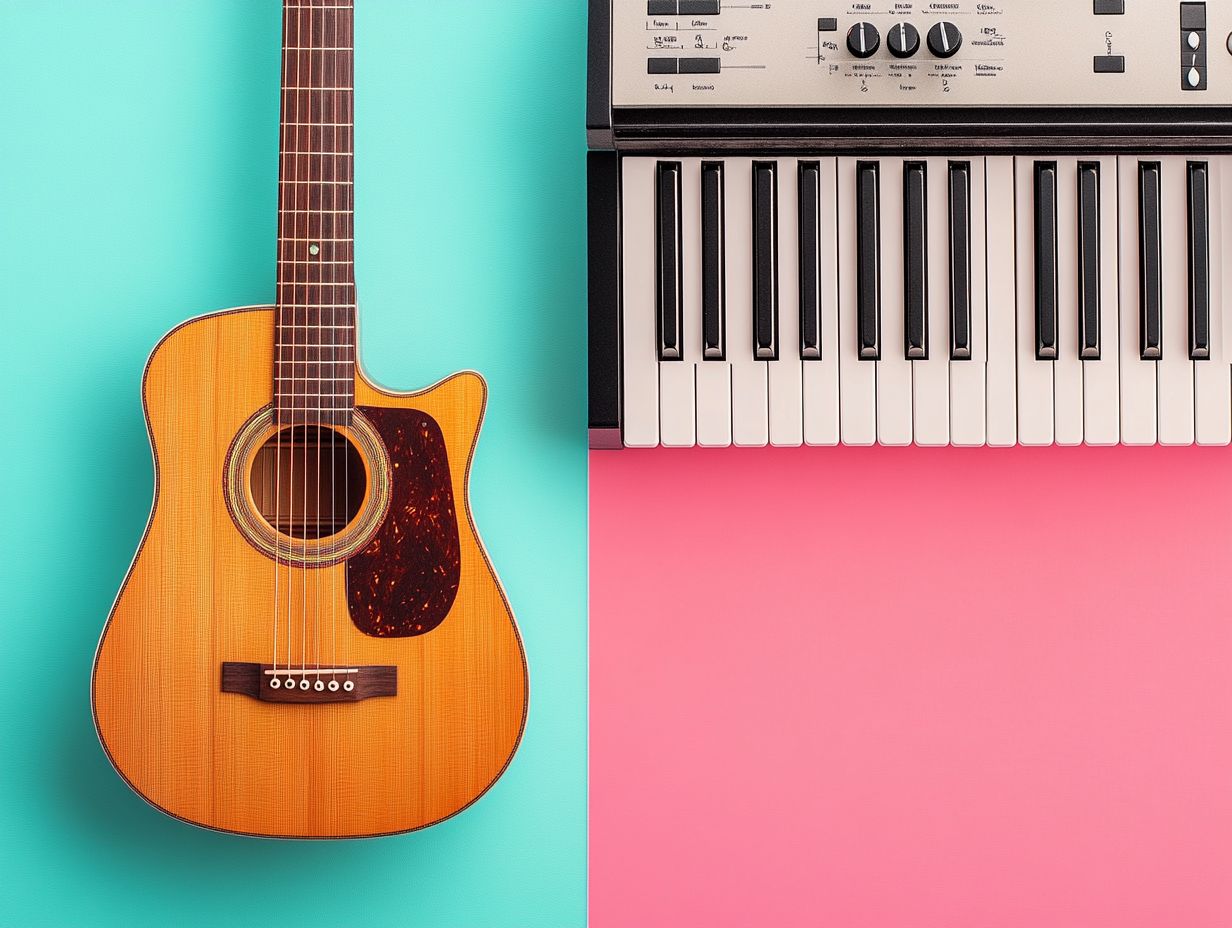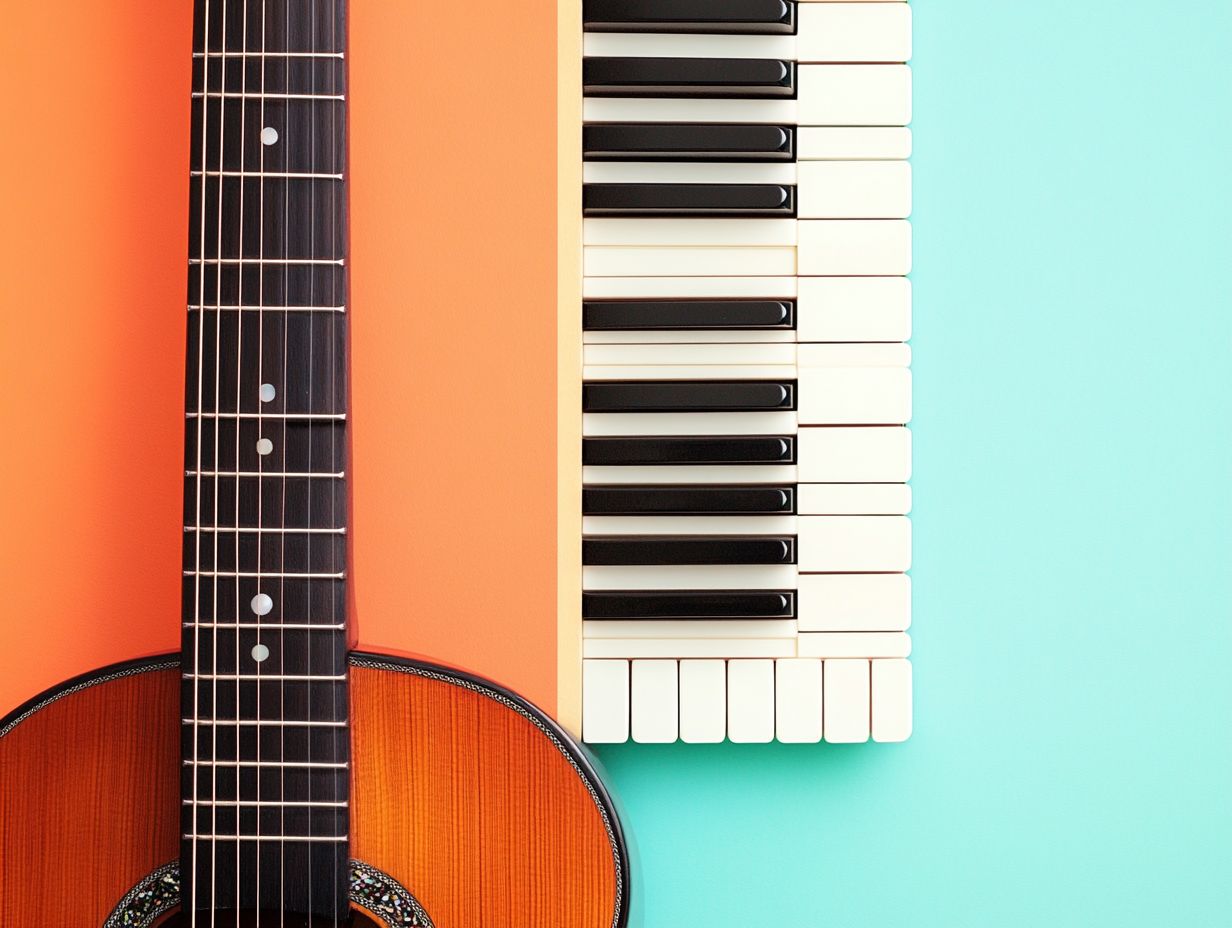This article explores the advantages and disadvantages of learning the guitar compared to the piano, aiming to assist aspiring musicians in choosing the right instrument for their musical journey. It examines which instrument is easier to learn, the factors that influence the learning curve, and practical tips that can benefit beginners with both instruments.
Overview of the Instruments

The guitar and piano are two of the most popular musical instruments in the world, each possessing unique characteristics, learning processes, and cultural significance. Their acoustic and electric variants offer a wide range of sound quality and resonance, appealing to different user experiences and genre preferences.
While effective teaching styles, learning materials, and social settings play a crucial role in a student’s musical education, both the guitar and piano share common attributes such as chords, scales, and rhythm, all of which can significantly influence a student’s journey in music.
Pros and Cons of Learning Guitar
Learning the guitar comes with its own set of advantages and disadvantages, including its acoustic properties and ease of amplification which contribute to its sound versatility.
Pros of Learning Guitar:
- The guitar is often easier to learn and play compared to many other instruments. Its learning curve is shorter, making it an excellent choice for beginners interested in developing finger dexterity and understanding basic music theory.
- There is a wealth of resources available, including countless online courses, tutorials, and videos. Guitar lessons can be found in various formats, such as one-on-one instruction, group classes, instructional videos, and mobile apps, offering diverse teaching techniques suited to different learning styles.
- The guitar is relatively affordable and portable, making it an accessible instrument for beginners. Many budget-friendly options for both acoustic and electric guitars exist, and they are easy to transport, enhancing their appeal.
- As a versatile instrument, the guitar is popular across numerous music genres and can be played solo or as part of a group.
- Playing the guitar offers mental and physical benefits, helping to develop fine motor skills and improve hand-eye coordination. It can also serve as a source of stress relief, self-expression, and social interaction, promoting creativity and personal satisfaction through music.
Cons of Learning Guitar:
- Mastering the guitar requires significant practice and dedication. Learning the basics, including chord progressions and finger placements, takes time and involves building the necessary muscle memory.
- It can take a while to feel comfortable playing the guitar. Developing finger dexterity and forming calluses on fingertips can be a slow process and may be uncomfortable initially, contributing to some physical discomfort.
- Chord progressions and strumming patterns can be challenging. Quickly transitioning between chords while maintaining a steady rhythm and tempo is a skill that takes time to develop, and this can be frustrating for beginners.
Advantages of Learning Guitar

One of the primary advantages of learning to play the guitar is its versatility, which allows musicians to explore a wide range of music styles, from rock to classical. This adaptability makes the guitar an easier instrument for many beginners to learn, as they can quickly apply their skills across different genres and enjoy a sense of accomplishment through various performance opportunities, whether playing solo or as part of an ensemble, enhancing their creative and artistic expression.
As they master chord progressions, aspiring guitarists will find joy in creating their own melodies, experimenting with improvisation, and exploring improvisational skills, a hallmark of styles like blues and jazz. These genres celebrate the unique voice of the guitarist, enabling them to express their personality and creativity, as well as their emotional connection to the music.
The guitar also serves as a backbone for popular music styles such as pop and country, where catchy riffs and heartfelt strumming patterns captivate audiences. This combination of accessible learning, diverse musical expression, and creative potential makes the guitar an appealing choice for anyone eager to enter the world of music and explore their own artistic journey.
Challenges of Learning Guitar
Learning to play the guitar presents several challenges, including the following:
- Learning Curve: The initial learning curve for guitar can be steep. Achieving finger dexterity and developing muscle memory are particularly important and require dedicated practice and progress tracking.
- Physical Discomfort: Many learners experience physical discomfort due to the unnatural finger positioning needed to play various chords and scales. This discomfort can lead to stress and may result in skipped practice sessions, significantly hindering progress.
- Solution: Aspiring guitarists should aim to practice in small increments of no more than 20 minutes at a time, gradually increasing this duration as their comfort level improves.
- Discipline: Establishing a disciplined practice routine is crucial for mastering the instrument.
- Solution: Learners should be mindful of their frustration levels and strive to keep them in check. Frustration is a natural part of learning to play any instrument, so it’s essential for learners to be patient with themselves.
- Solution: Incorporating breaks into practice sessions, celebrating small victories, and seeking support from a community can greatly enhance the learning experience.
Pros and Cons of Learning Piano

Learning to play the piano comes with both advantages and disadvantages.
One of the primary benefits is that the piano serves as a foundational instrument for understanding music theory. It is an excellent first instrument, as it provides a comprehensive framework for exploring melody, harmony, and rhythm.
However, mastering the piano can be a lengthy process, particularly for beginners. They must develop finger dexterity and hand-eye coordination while also managing the physical demands of playing the instrument.
Advantages of Learning Piano
One of the key benefits of learning the piano is the ability to grasp music theory, which is essential for enhancing coordination and musical skills. The piano’s layout enables students to easily visualize musical elements such as chord progressions and scales, facilitating their engagement in musical expression and creativity through composition and improvisation, enhancing their understanding of harmony and melody.
Piano lessons significantly improve cognitive skills, including memory and problem-solving. Playing the instrument requires reading complex music notation while simultaneously coordinating hand movements, which involves a considerable cognitive load. This dual task enhances focus and sharpens auditory skills, allowing students to intuitively recognize differences in pitch and harmonies, contributing to their overall musicality and ear training.
Additionally, the piano serves as a powerful medium for emotional expression, enabling individuals to convey their feelings through music and connect emotionally with their audience. This emotional foundation encourages students to explore a diverse range of genres, including classical, jazz, and pop, among others.
Challenges of Learning Piano

Learning to play the piano presents several challenges, including the technical skills required for effective playing, which can negatively impact students’ overall experiences. The technical skills required for effective playing often result in a steep learning curve, necessitating extensive practice time and frequently leading to performance anxiety, especially for those unaccustomed to playing in public.
Many students find the intricacies of musical notation overwhelming at times. Additionally, the need for regular practice can sometimes foster frustration when progress does not meet expectations, challenging a student’s patience and commitment.
To help alleviate performance anxiety, it is beneficial to employ relaxation techniques, such as deep breathing exercises, before playing. Focusing on small, achievable goals during practice sessions can also be effective.
Incorporating fun and familiar pieces into their practice can enhance enjoyment, transforming a musical activity that may often feel like a chore into one that is immensely enjoyable and motivating, ultimately helping to build confidence.
Which Instrument is Easier to Learn?
Determining whether the guitar or piano is easier to learn depends on various factors that can significantly influence a student’s learning experience, such as the physical setup, accessibility, and personal preferences.
The most crucial factor is personal preference; some students may find the physical aspects of learning the guitar more accessible, while others might prefer the structured learning approach associated with the piano.
Additionally, considerations such as age, genre preferences, and available resources—such as teacher accessibility and online learning materials—play important roles in this decision.
Factors to Consider
When considering whether learning guitar is easier than piano, it is important to take several factors into account:
- Learning Method: Do you prefer structured lessons or a self-taught approach?
- Cost: Which instrument is more affordable?
- Maintenance: Which instrument is easier and less expensive to maintain?
- Commitment: How much time are you willing to dedicate to practice and routines?
Additionally, motivation plays a significant role, as a motivated learner is more likely to persevere through challenges. Setting realistic goals can greatly influence progress and maintain motivation. For instance, if a learner aims to become proficient in a specific song but struggles with it, they may feel discouraged. Conversely, if they set a goal of learning a simple chord progression or melody first, they are more likely to succeed, leading to a sense of accomplishment that can inspire continued learning.
Furthermore, the type of music one wishes to learn can also impact motivation and engagement. Some instruments are better suited for particular genres, which can affect the player’s overall experience, proficiency with the instrument, and the artistic expression they can achieve.
Tips for Learning Guitar and Piano
There are numerous helpful tips for learning guitar and piano that can enhance your learning experience and accelerate your progress, regardless of which instrument you choose. Developing a structured practice routine, focusing on skill transfer, and seeking peer encouragement can contribute to a fulfilling musical journey and lifelong learning.
One essential tip is to set a regular practice schedule. Consistent practice helps develop the necessary techniques, coordination, and finger dexterity for both instruments, such as the piano or guitar. This can include practicing chords, scales, and music theory.
Additionally, keeping track of your progress can be beneficial; monitoring your advancement through various levels of learning can boost motivation and build confidence. It’s essential to stay committed and patient, as learning to play an instrument involves navigating through different stages of difficulty.
Practical Advice for Music Beginners
For beginners learning guitar or piano, practical advice on techniques and approaches can significantly enhance both their progress and enjoyment. Understanding music notation and developing a familiarity with the keyboard or fretboard is crucial at this stage.
Combining various methods, such as in-person or online lessons along with YouTube videos and apps, offers an effective and flexible way to learn. Setting aside a regular time for practice is essential for developing emotional expression and technical skills. Online courses and resources can also provide valuable teaching materials to enhance your learning experience.
Additionally, learning with others can provide motivation and encouragement for beginners. Online music communities serve as excellent sources of inspiration, allowing learners to share experiences and seek advice from fellow musicians. Participating in group challenges, even if they are virtual, helps foster a sense of community. This peer encouragement can significantly improve your skills, especially when facing difficult techniques or challenging pieces.
Furthermore, local recitals or open mic nights provide fantastic opportunities to showcase newly acquired skills, which can greatly boost confidence. Patience is vital, as the journey of learning any new skill is often filled with challenges, but the enjoyment of the experience makes it worthwhile. Engaging in live performances also helps with overcoming performance anxiety and builds resilience.



